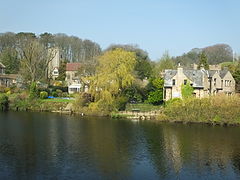Halton-on-Lune
| Halton-with-Aughton | |
|---|---|
 Halton village, viewed from the far river bank |
|
|
Halton-with-Aughton shown within Lancashire
|
|
| Population | 2,277 (2011) |
| OS grid reference | SD502648 |
| Civil parish |
|
| District | |
| Shire county | |
| Region | |
| Country | England |
| Sovereign state | United Kingdom |
| Post town | LANCASTER |
| Postcode district | LA2 |
| Dialling code | 01524 |
| Police | Lancashire |
| Fire | Lancashire |
| Ambulance | North West |
| EU Parliament | North West England |
| UK Parliament | |
Halton-with-Aughton is a civil parish and electoral ward located 3 miles (5 km) east of Lancaster, England, on the north bank of the River Lune. The main settlement is the village of Halton, commonly just called Halton, in the west, and the parish stretches to the hamlet of Aughton in the east. It lies in the City of Lancaster district of Lancashire, and has a population of 2,227, down from 2,360 in 2001.
Halton consists primarily of modern housing, amongst which can be found a number of 17th- and 18th-century buildings. It has a primary school and there is a post office and other local amenities including a very successful community centre. The village is on the edge of the new Heysham to M6 Link Road.
Halton railway station was on the opposite bank of the river from the village, linked by a narrow toll bridge. The station closed in 1966, but the station building and part of one platform survive beside the cycle path along the disused "little" North Western Railway.
Halton was the centre of important Anglo-Saxon manor held by Earl Tostig, the brother of King Harold before the Norman Conquest. Count Roger of Poitou who held the fee after the regime change, and his successors, preferred Lancaster.
The 19th-century textile mills once harnessed the power of the Lune. Earthworks on Castle Hill show evidence of an 11th-century Norman motte and bailey castle. In the churchyard of St Wilfrid's Church stands the Halton Cross believed to have been carved by Norsemen over 1,000 years ago.
...
Wikipedia


